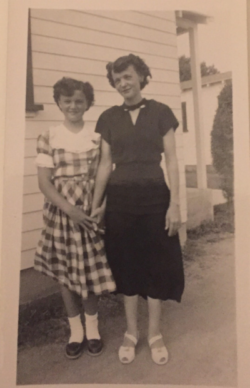by Alani Jamile. This article originally appeared in Honolulu Civil Beat.
Grandma Jamile has always been a tough cookie.
From her rough childhood to experiencing a heartbreaking divorce, she has been through it all and never let anything get to her. She found ways to pick herself up in the worst situations and kept moving forward.
I am her first grandchild, which meant I was the one who spent the most time with her out of the six grandchildren she has. As I grew up, she would tell me stories in greater detail about her life. I knew about her growing up an only child with an alcoholic father, her mother abandoning her for a few years and taking off with another man whom she ended up marrying, and her dream to get the education she has always desired.
However, I never knew about what I am about to tell you. No one in my family did.

In May of 1969, my great grandmother, whom I called Big Grandma, lost her beloved second husband, Walter, to heart disease. He was 50 years old. He was the only source of income for their household. Medical bills were piling up in my great grandmother’s lap and there wasn’t enough money in her pocket for her to pay them.
Then something miraculous happened. Walter’s doctor saw the struggle in the family and turned to not my great grandmother, but my grandmother. He handed her a letter that said that Walter was permanently ill so that the state could pay for the medical bills that were about $35,000.
The gesture of this doctor to help my grandmother saved the family in so many ways. But Big Grandma was still on the edge of being homeless.
During this tragedy, my grandmother was on maternity leave taking care of two young children: a 3-month-old and a 2-year-old. She wasn’t supposed to go back to teaching until September of that year. However, she went back to teaching full time early to earn enough to not only support her family, but also her widowed mother who was going to lose her house.
Medical bills were being paid for but my great grandmother wasn’t going to have a place to live nor did she have a job to help pay for basic necessities. My grandmother paid her to watch the children while she was working so her mother could afford to buy an apartment. Although my great grandmother was receiving Social Security ever since Walter’s death, my grandmother still gave her $300 a month to supplement her own income.
I asked my grandmother if she ever considered having her mother live with her, and her response was sad yet very understandable:
“My mother was a very critical and stubborn person. Every tiny thing that I did somehow bothered her. Growing up, it was either the way I made my bed or how I washed the dishes, if it wasn’t perfect in her own eyes, she made me redo it. Even with school, I would get a B and she would ask me why I didn’t get an A+.
“In a way, she took away a lot of my self confidence and that scarred me. I didn’t want to go through that again, especially with my own children there too. I feel that I have scars from my experience living with her and if she did move in, I think I would have dealt with a whole lot more mental stress.”

Alani Jamile’s grandmother, left, took care of her mother — Big Grandma — even if met sacrificing her own work and family. Big Grandma died at age 99 in 2015.
My grandma was smart to let my great grandmother have her own apartment because she happily lived there until she was 93 years old. Grandma Jamile continued to always provide a place for Big Grandma at family events, holidays and the little apartment she loved living in.
As my great grandmother grew older, she stopped driving and started to have dementia. Once she couldn’t drive herself anywhere, my grandmother spent more time taking care of her. Visiting the apartment became a daily routine and so were doctor’s appointments.
My great grandmother needed more attention than ever. My grandmother was the one who attended to all of her needs. She still had to work full time and it was hard to leave my grandmother alone for long hours, so she paid a neighbor to watch over my great grandmother. My great grandmother did have Medicare from the age of 65 so she was stable but my grandma had to pitch in for things like food, laundry, and other basic necessities.
When Big Grandma turned 93, she wasn’t physically able to take care of herself anymore so my grandmother moved her into a home. Grandma Jamile continued to visit her daily to make sure she was doing alright and had everything she needed.
I asked her if she ever considered asking for help from my father and aunt and she said, “I thought about it but it was hard to because they were in college or out of the country. Plus, I didn’t want to be a burden for them, but I did ask your father to help pay for some daily products. But that was about it. Everything else I did on my own.”
I felt this sense of empathy for her and if I were older at the time, I would have liked to help out and do what I could have. She told me the greatest impact on her from taking care of her mother was the fact that throughout the day she always had to be worrying about her and making sure someone was there when she physically couldn’t be.
After six years of living in the home, Big Grandma passed away at 99 years of age on July 21, 2015. Although living until she turned 100 years old was her dream, she had lived for nearly a century and I can only imagine the number of events she witnessed throughout all those years.
I asked my grandmother if she regretted anything during the long years of looking after my great grandmother and she said, “I don’t regret anything at all. In fact, I think I did everything I could to help her, but to also ensure my mental health. I made sure the choices I made were the right ones for her and for me. Being intelligent helps, dear, especially in situations that may change your life forever.”
The opinions expressed in this article are those of the author and do not necessarily reflect those of the Diverse Elders Coalition.

